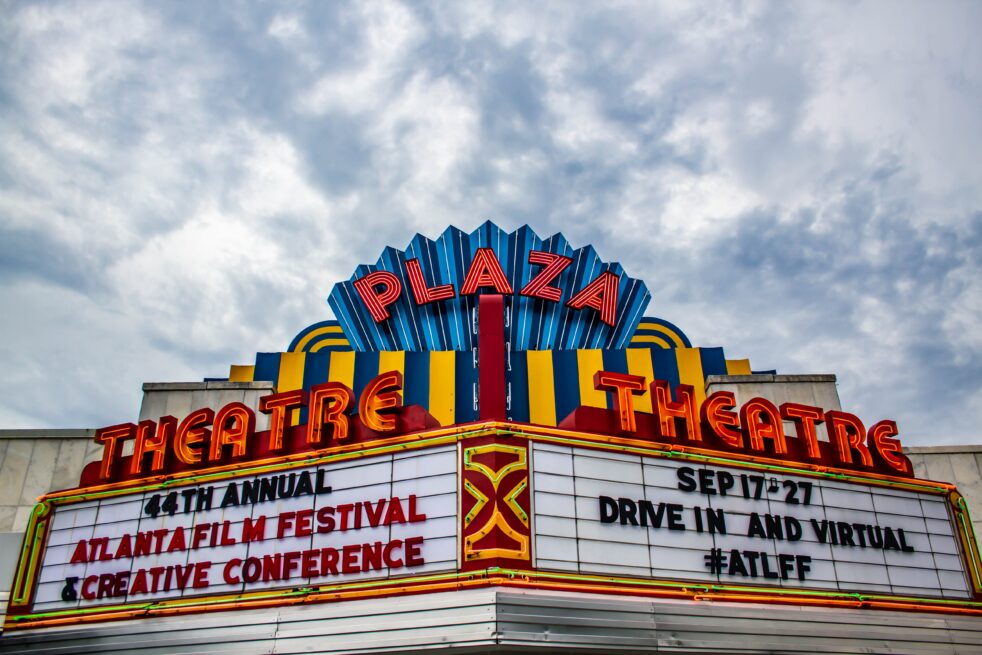The 2020 Atlanta Film Festival (ATLFF) has differed from the 43 that preceded it for a few reasons. For one thing, the festival received a record-breaking 8,550 submissions from which a programming team working since May 2019 selected only 148 for screening at the festival.
For another, the festival, which historically takes place in the spring, was pushed to September due to the COVID-19 pandemic.
Associate Director Cameron McAllister remembers when the pandemic hit in March, “We were like ‘We don’t know what we’re doing but we’re not doing it now.’”
Nevertheless, the 2020 festival retained almost all of its original programming, albeit in a virtual or drive-in format rather than the traditional movie theater screenings that have been rendered nearly obsolete by the virus.
“Nothing is more important than the health and well-being of our filmmakers, attendees, staff and volunteers,” said ATLFF’s Executive Director Christopher Escobar, “It became obvious that this adjustment was the only way to achieve our goals this year.”
McAllister admits that there are some drawbacks to a drive-in format. Films can only be shown at night, for instance, and not everyone is comfortable leaving their house right now, much less attending a drive-in. But he was happy with the turnout on the festival’s opening night last Thursday at all three of the screening venues — Dad’s Garage Drive-In, Pullman Yard and the Plaza Theatre Drive-In.
“Just because it’s not pulpy doesn’t mean it can’t be enjoyed for a drive-in festival,” said McAllister.
The Atlanta Film Festival, one of only two-dozen Academy Award qualifying festivals in the U.S., is hallmarked by its commitment to diversity both in the stories being told and the people telling them. Of the 38 features, 86 shorts and 14 creative media (including music videos and virtual reality experiences), 55 percent are created by female filmmakers and 51 percent are directed by people of color.
The festival’s specialty titles include “New Mavericks,” “Pink Peach,” “¡CineMás!,” “Noire,” and “Georgia”, which feature female, LGBTQ+, Latin America, Black and local representation in film, respectively. The festival also features an additional eight Marquee screenings and 32 Creative Conference virtual events.
“Our selections bring the most compelling visual storytelling the world has to offer to Atlanta, while also representing the rich diversity of the city itself,” said Escobar.
Some of the highlights of the closing weekend lineup (September 25-27) include Pablo Larrain’s “Ema,” which McAllister describes as a “brain-melting colorful dance raggaeton extravaganza;” “Malpaso,” a black-and-white film about two twin brothers directed by Héctor Valdez; and “Sylvie’s Love,” Eugene Ashe’s wartime jazz lounge romance. Saturday’s closing night presentation is Julie Taymor’s “The Glorias” at the Plaza Theatre Drive-In, starring Julianne Moore as legendary feminist, activist and journalist Gloria Steinem.
Saturday’s lineup also includes a narrative short film block called “What’s Up With the Youth?” at Dad’s Garage Drive-In, described as “young souls make their way in an old world.” Ninna Pálmadóttir’s “Paperboy” heads up the program.
“Paperboy” tells the story of a small town newspaper delivery boy, based on an experience that Pálmadóttir herself had of unburdening her soul to a total stranger who she never saw again.
The film was shot in a small town on the east coast of Iceland, Pálmadóttir’s home country; coming as it did from such a spectacular part of the world, Pálmadóttir strove to incorporate nature not just into a frame but into the story and the lives of her characters.
“I’m excited to show a film from the tiny island that is Iceland to audiences that don’t see a lot of snow and ice,” she said.
Charlotte Benbeniste’s “Bye Bye Body,” which follows “Paperboy,” tells in ten minutes the story of a young woman named Nina who is attending a weight loss camp and can’t seem to reach her goal weight.
The film is derived from Benbeniste’s own experience at a weight loss camp, which she describes as “an absurd, surreal experience” that, retrospectively, became a forum for “aspirational thinking to do with the female body.” Benbeniste shot “Bye Bye Body” on 35mm film, which gave it a sense of tactility that reflected the film’s focus on body and touch.
“Broken Bird,” also a part of “What’s Up With the Youth?” is written, directed and produced by Rachel Harrison Gordon. A coming-of-age short, it follows a biracial girl named Birdie as she prepares for her Bat Mitzvah.
The film is largely autobiographical — Gordon lived in the same family structure and felt the same disconnect from Judaism as Birdie. For a long time, she says, she didn’t feel white enough, Black enough or Jewish enough. It took her years to feel comfortable in what she calls “this hybrid skin.”
Birdie also shares a similar relationship with her father with Gordon, who connected with her father through music “when we didn’t know how else to communicate.” Tender, whimsical, and poignant, “Broken Bird” explores identity, race and family and journeys deep into Gordon’s own memories.
Tickets for “What’s Up With the Youth?” and the rest of the weekend’s offerings, along with information on virtual screenings and Creative Conference events, are available online at AtlantaFilmFestival.com. Find Pálmadóttir, Benbeniste, and Gordon at ninnapalma.com, charlottebenbeniste.tv, and rachelhg.com.
